Coronavirus: 'Do not drive from England to Wales to exercise'
- Published
- comments
Here are the key differences between lockdown rules in Wales and England
People have been warned they are not allowed to drive from England into Wales for exercise as the two countries move to different lockdown rules.
Rules have been relaxed in England, meaning people can "drive to other destinations".
In Wales, people cannot travel "a significant distance" from home.
Police forces in Wales have the power to fine people for making non-essential journeys and that includes those travelling from England into Wales.
First Minister Mark Drakeford said the four Welsh police forces were concerned traffic into Wales would continue to increase as a result of the change.
He criticised the way Boris Johnson made the announcement without making clear it applied to England, and said the UK government was getting it "wrong".
"I want to be clear - in Wales, it is Welsh law which applies," he told the daily Welsh Government press conference.
He said travelling to Wales to exercise was not exercising locally.
"It is Welsh law that applies in Wales"
Earlier, the Welsh minister responsible for the coronavirus recovery, Jeremy Miles, said rules "do not permit people to get in their car and drive to destinations in Wales".
"And that also means people getting in their cars in England," he added, saying police in Wales "absolutely have the power to fine" people for making non-essential journeys.

'What are we supposed to do?'

Megan and Spencer Smith say they do not know if they should listen to the Welsh Government or their employers
Spencer Smith lives in Wrexham but works in the Ironbridge Museums in Shropshire.
He said the different measures were confusing: "I work down in Ironbridge, which is about an hour from the border, and my wife still works as a teacher in the Wirral.
"If things do change, then one of the things we're concerned about is the amount of people we might come in contact with."
He said he "never" leaves the house in case he becomes ill.
"My wife also worries a huge amount about going out to work - mainly because of the possibility of close contact with others," he added.
"This is what worries us most, what are we supposed to do?
"Listen to what our government says and stay home or listen to our employers who could easily say that we have to go back to work.
"I tend to think that I'll stay home because I don't want to catch this thing. I'm lucky in the fact that I am yet to come close to it, but I do worry about those who must return to the workplace."
A UK government spokesman said the guidance on workplace safety in Wales and England was similar, and people can travel to work if they cannot work from home.
He added: "People working in Wales should follow the guidance and regulations set by the Welsh Government."

'Reckless and unforgiveable'
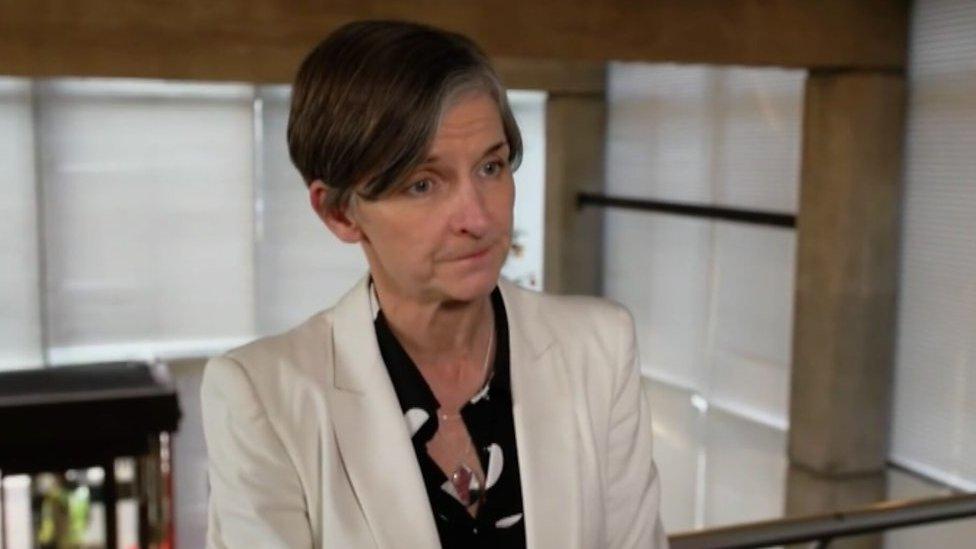
Prof Laura McAllister said the issue was public safety not political issues
Laura McAllister, professor of public policy at Cardiff University's Wales Governance Centre, called the differences in policy between the nations "reckless", "unforgiveable" and said they were putting people's lives "in jeopardy".
Speaking on BBC 5Live, she said: "It's been left to our agencies, like the police, like the coastguard, like the fire and rescue services to enforce [Welsh regulations]. This really is a very reckless policy.
"The messaging needed to be the same in this instance while we're at the same stage of fighting this pandemic.
"The more confusion around messaging, the more public safety and the more people's lives are put in jeopardy."
She also said the difference in the "stay home" message - now altered to "stay alert" in England - should have "required a much more respectful and collaborative approach across the four nations of the UK".
"Human life is at stake here. This isn't a political issue, this is an issue of public safety, and I find that quite incredible," she added.
What does Boris Johnson say?
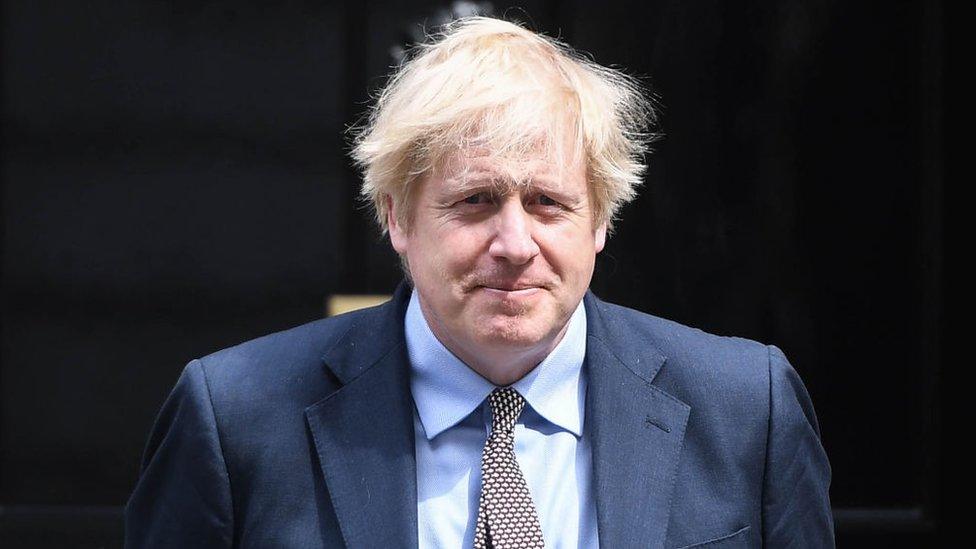
Concerns were raised that PM's announcement could encourage people to drive to Wales
Speaking in Westminster on Monday afternoon, Prime Minister Boris Johnson appeared to dismiss concerns over the differences that now exist in the UK's nations.
Asked about enforcing people not crossing borders, he said there would be "myriad hypothetical questions".
"This is the moment for the whole country to come together, obey those rules and apply their common sense in the application of those rules," he said.
What about second homes?
Mr Johnson told the House of Commons: "We don't want to see people travelling to another home for a holiday, or a second home."
The prime minister was responding to a question from Brecon and Radnorshire Conservative MP Fay Jones during a Commons debate on his statement about changes to lockdown rules in England.
She asked: "Would he agree with me that while the R number [rate of infection per person] continues to vary across the country, restrictions in Wales remain the same and the changes that he announced last night are not a green light for tourism or for people to travel to their second homes in Wales?"
Mr Johnson replied: "Absolutely."
"We don't want to see people travelling to another home for a holiday or to a second home, that is not what this is about," he added.
"It is about allowing people the pleasure of going to parks and places of natural beauty."
The Welsh Government has introduced a strict ban on second home visits, in order to protect health services in rural and tourist areas from being overwhelmed by demand for treatment.
What does it mean for Wales' police forces?

Essential travel only: People are being warned not to come into Wales from England to exercise
Mr Drakeford said the four police chief constables in Wales had reported "a distinct increase in activity over the bank holiday weekend".
This followed "many UK national newspapers reported a major easing of the lockdown was on the horizon", he said.
He said the police had also seen an increase in alcohol-related violence associated with VE Day celebrations and increased traffic across many areas of the road network.
South Wales Police Federation chairman, Steve Treharne, said where there had been an easing of regulations in England "people will see the messages and may take up more activities in Wales."
Driving from England into Wales "still becomes an offence," he said.
Gwent Police and Crime Commissioner, Jeff Cuthbert, feared the prime minister's message would cause confusion: "I heard what Boris Johnson said yesterday, whilst we are clear what the rules in Wales are, certainly in the eyes of the public I'm sure what he has said has muddied the water.
"Undoubtedly, because of the strength of the English media there is going to be confusion in the minds of many people.
"It could well be because the prime minister didn't mention the situation in Wales."
There were calls for greater fines for people driving to Welsh tourist hotspots than the current £60-£120 fixed penalty notices that police can hand out for breaches.
Plaid Cymru called for £1,000 rising to £3,200 for repeat offenders.
Fines in England are increasing to £100 from Wednesday. The Welsh Government said it is not planning to change the fine system but is keeping the matter under consideration.
North Wales Police and Crime Commissioner, Plaid's Arfon Jones, dubbed differences in English and Welsh measures a "complete mess".
"It's going to be very difficult to get the message across that they should not come to Wales because the measures are different, and that they will be stopped and fined if they break these rules," he said.
Mr Johnson had made North Wales Police's work "so much harder, and unnecessarily so," Mr Jones added.

Cross-border golf
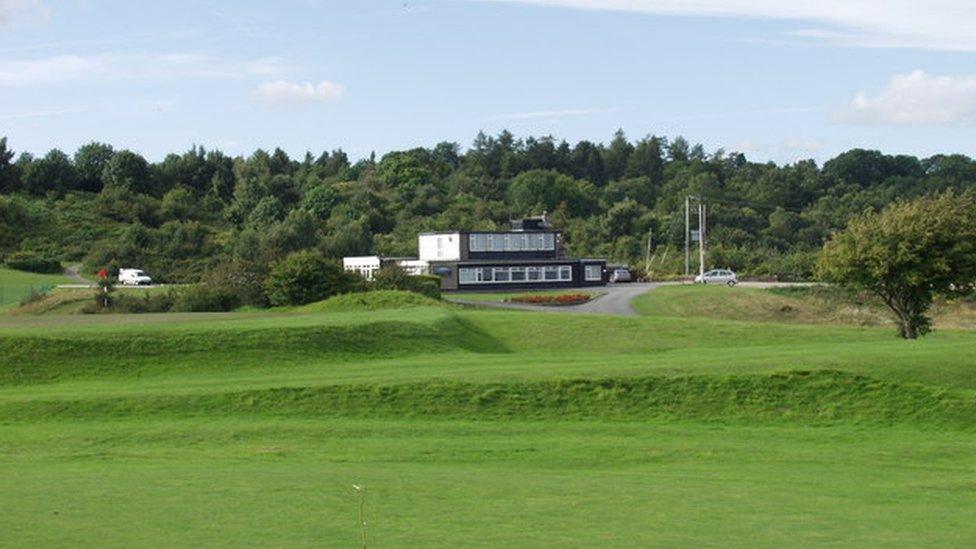
Llanymynech Golf Club, which sits on the border, has 15 holes in Wales and three in England
Among businesses allowed to open in England are golf courses.
Llanymynech Golf Club, in Shropshire, sits on the border and has 15 holes in Wales and three in England.
Wales Golf said courses in Wales "must remain closed for now."
A spokesman said: "As a sport we must work together to resume play responsibly, as and when the relevant government determines it is safe to do so.
"We must ensure that the safety and wellbeing of everyone involved from golfers, to club staff and greenkeepers is maintained at all times."

THE R NUMBER: What it means and why it matters
LOOK-UP TOOL: How many cases in your area?
EXERCISE: What are the guidelines on getting out?
RECOVERY: How long does it take to get better?
SCHOOLS: When will children be returning?

- Published10 May 2020
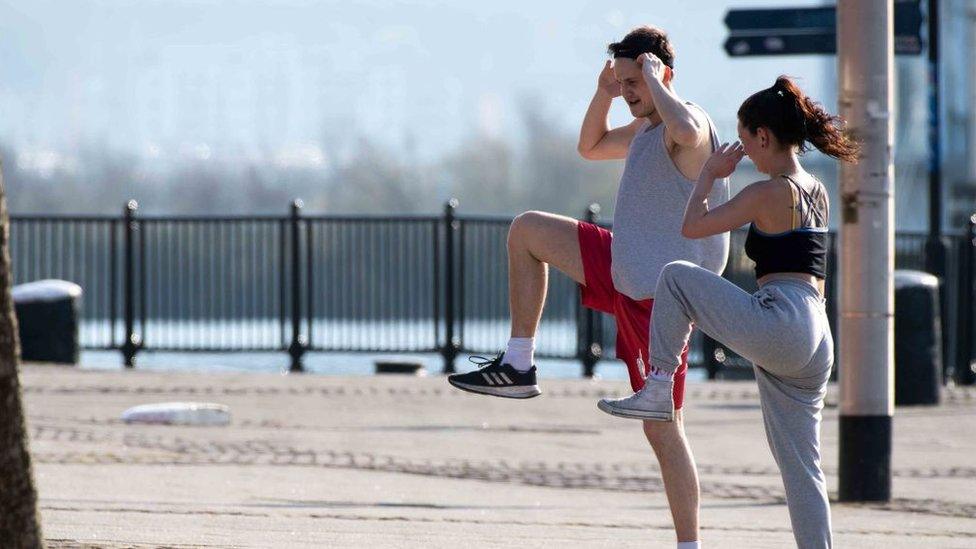
- Published10 May 2020
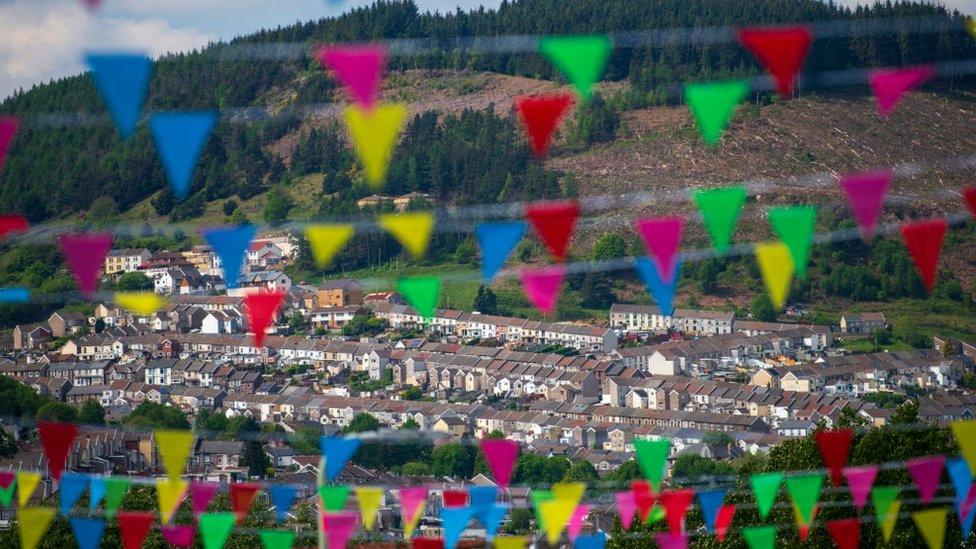
- Published27 September 2020
